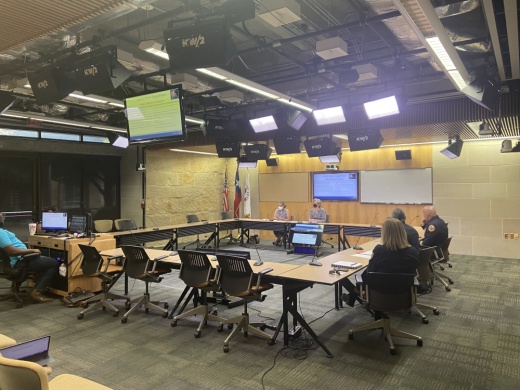Editor's note: This story was updated to correct Erin Martinson's name as well as details related to plaintiff representation.
The city of Austin Public Safety Commission outlined at an Aug. 1 meeting policies and actions that need to be taken to fulfill a settlement agreement in a pair of 2019 lawsuits that alleged the Austin Police Department mishandled sexual assault cases.
Some of the actions that still need to be taken include creating a survivor’s survey, a public information campaign and a public apology from the APD.
Downtown Austin Police Commander Jeff Greenwalt said the APD has been working to implement the changes agreed to in the lawsuit settlement as well as creating some of their own resources.
The APD added a detective to work sexual assault cases in 2021, three victim service counselors in 2020, two victim service counselors to the crisis unit in 2021 and the creation of a cold case unit as well as additional victim services personnel to the academy staff.
Those implementations were enacted in the 2019 and 2020 budgets.
The lawsuit was filed after a Texas Department of Public Safety audit found the APD mishandled a portion of 2017 sexual assault cases. City Council then brought in the Police Executive Research Forum to investigate the handling of sexual assault cases over a seven-year span. After the audit, victims of sexual assault in Austin sued the city over the mishandling of cases.
Greenwalt said the department is completely up to date with processing all sexual assault kits, including sending the kits to forensics within 30 days and receiving results within 90 days.
The APD is working on creating a notification process where the victim of a sexual assault case is notified about any updates in the case, Greenwalt said. The notification process involves notifying a victim when there has been an update in the case, which can come from getting a DNA match in the case, and how a victim should be notified.
“There is a request for a survivor notification protocol, which has been developed and is in the final stages of getting signatures through our [Sexual Assault Response] Team,” Greenwalt said.
Greenwalt said the APD follows the steps of this victim notification protocol even though they are still waiting for all the signatures from the SART.
Jennifer Ecklund, an attorney with Thompson Coburn LLP, who is representing the 15 plaintiffs in the case, said there will be two more Police Executive Research Forum, or PERF, audits that will take place as part of the settlement agreement.
“[The two audits include] one to ensure the terms of our settlement agreement are met and one to ensure that the PERF recommendations have been implemented appropriately or as agreed upon,” Ecklund said.
According to Ecklund there are other agreed upon pieces of the settlement that have not been acted upon yet.
“There's also some other pieces to the settlement that were agreed upon that have not yet come to pass that we expect will, including a public information campaign, creating a survivor's survey, having a sit-down meeting with the chief for all the survivor-named plaintiffs and an apology process,” Ecklund said.
Erin Martinson, director of the Austin Special Victims Unit, said District Attorney Jose Garza made changes to the handling of sexual assault cases prior to and after lawsuit settlement, when he took office Nov. 3, 2020.
“We convened a community advisory board made up of survivors, including one plaintiff now from the class action lawsuit, and some experts and advocates in the community,” she said.
Martinson explained the advisory board is working on creating more publicly available access to sexual assault cases.
“Part of what that advisory board is working on is data transparency and creating a publicly more user-friendly and publicly available platform for folks to access data about what's happening in our sexual assault unit, the number of cases we're staffing, [what] we're accepting, what the resolution of those cases are—so we're working on that,” she said.
The Public Safety Commission recommended bringing the topic of the lawsuit settlement back for further discussion at their next meeting.





